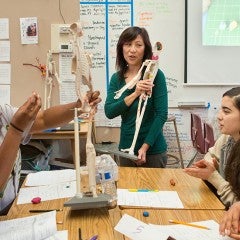But they’re running up against a stubborn challenge: few students are signing up for them.
While the number of bachelor’s degrees offered by Texas’ community colleges has more than doubled since 2020, only 4,500 students enrolled in bachelor’s programs across 18 community colleges last fall. By comparison, about 114,000 students obtained a bachelor’s degree from a Texas public university and nearly 90,000 secured an associate degree from a state community college in 2024.
Community college leaders say they’re offering students a low-cost, accessible avenue to solid jobs and higher pay in critical fields, such as nursing, teaching, cybersecurity and business management. Yet they’re battling a lack of awareness about their bachelor’s programs and lingering uncertainty about the quality of the programs — with limited marketing resources at their disposal.
Last fall, about 1,150 Houston-area students were enrolled in 15 programs offered across six local community colleges. The largest share, totaling 800 students, attended the Lone Star College System.
“We've been offering these programs at Lone Star for five years now, and I think there's still people in our adjacent communities that don't know what these programs are,” said Megan Mariveles, the school’s interim executive dean of baccalaureate programs. “I think that’s our challenge, that’s always been our challenge, and it’ll always be our challenge.”
‘Ready to work’
Texas lawmakers first allowed community colleges to offer bachelor’s degrees about 20 years ago, though they’ve limited their growth.
Today, most community colleges can offer up to five bachelor’s degree programs related to several industries with a shortage of high-skill labor. (Students typically obtain an “applied” bachelor’s degree, which signals that their courses were more career-oriented and less theoretical than a traditional bachelor’s degree.)
Education and legislative leaders across Texas have heralded bachelor’s programs at community colleges, pitching them as a solution to specific workforce woes.
In the coming decade, Texas health care employers’ demand for registered nurses is projected to outpace supply by 50,000-plus workers. Roughly 13,500, or 30%, of the state’s newly hired public school teachers in 2024-25 weren’t certified, a credential that requires a bachelor’s degree. Statewide, there are about 42,600 job openings for cybersecurity-related fields, according to workforce insights firm CyberSeek.
“Business, industries, they have no time to train anybody. They want people ready to work,” said Ali Esmaeili, the dean of math, science, information technology and bachelor programs at South Texas College in the Rio Grande Valley.
The target audience
Typically, students must have a 60-credit hour associate degree before enrolling in a community college bachelor’s program. Completing the full 120-hour requirements of a bachelor’s degree can be tens of thousands of dollars cheaper at a community college compared to a four-year university.
Most classes also are partially or fully online, catering to students with job and family responsibilities.
“We're targeting those students and those working professionals who probably wouldn't have gone and sought out a bachelor's degree had it not been offered by our college,” Mariveles said.
Early returns on community college bachelor’s degree programs are promising, though sample sizes are relatively small.
An analysis of state wage data by New America, a liberal-leaning think tank, found little difference in earnings between students who obtained a bachelor’s degree from a community college or a four-year institution in 2018. State officials don’t publish graduation rates for students in community college bachelor’s degree programs, but available enrollment and degree data suggest completion rates slightly exceed four-year institutions.
‘We’re gonna get them in’
For now, community colleges are plowing ahead with building new programs and tackling enrollment challenges.
At South Texas College, which has offered bachelor’s degrees for about 20 years and enrolls the most bachelor’s students among the state’s community colleges, administrators have taken several measures to attract students. They regularly meet with high school classes, travel to workplaces, collaborate with local industry leaders and advertise across campus to pitch their programs.
Yet administrators said they still struggle to inform prospective students about their opportunities. In an interview, an administrator recounted that just two out of 32 students in a high school class raised their hands when asked if they were aware of the bachelor’s programs during a recent visit to pitch them.
“The demand is so high in our community, and the word isn’t really out there because people are associating bachelor’s with universities,” said Anahid Petrosian, South Texas College’s vice president and provost for academic affairs and economic development.
Mariveles said she’s optimistic that enrollment will pick up as more community colleges launch programs, shift away from pandemic recovery and invest in much-needed marketing.
“The numbers have gone up every single semester,” Mariveles said. “We’re not gonna turn students away. We’re gonna make it work. We’re gonna get them in. We want to serve our community.”



